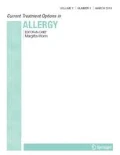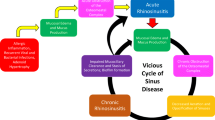Abstract
Purpose of Review
Chronic rhinosinusitis and other sinopulmonary infections can be a hallmark of impaired immunity in children. Rhinosinusitis in the setting of immunodeficiency can often be chronic and refractory, and involve opportunistic pathogens. We review the evaluation and management of pediatric chronic rhinosinusitis in the context of primary immunodeficiency diseases.
Recent Findings
Immunodeficiencies found to be associated with chronic rhinosinusitis include common variable immune deficiency, X-linked agammaglobulinemia, antibody deficiencies, hyper-IgM syndrome, hyper-IgE syndrome, Wiskott–Aldrich syndrome, activated PI3K disease, DiGeorge syndrome, and chronic granulomatous disease.
Summary
Chronic rhinosinusitis in children may be a clinical manifestation of immunodeficiency. The evaluation and diagnosis of immunodeficiencies are essential for initiating appropriate therapeutic strategies, including antibiotics, prophylaxis, topical therapy, surgery, and immunoglobulin replacement.

Similar content being viewed by others
References and Recommended Reading
Papers of particular interest, published recently, have been highlighted as: • Of importance •• Of major importance
Cohen N, Hopkins C, Kern B. EPOSpocket guide2012.pdf. 2012;(23):1–20.
•• Brietzke SE, Shin JJ, Choi S, Lee JT, Parikh SR, Pena M, et al. Clinical consensus statement: pediatric chronic rhinosinusitis. Otolaryngol - Head Neck Surg (United States). 2014;151(4):542–53 Consensus statement on PCRS.
Veskitkul J, Vichyanond P, Pacharn P, Visitsunthorn N, Jirapongsananuruk O. Clinical characteristics of recurrent acute rhinosinusitis in children. Asian Pac J Allergy Immunol. 2015;33(4):276–80.
Sedaghat AR, Phipatanakul W, Cunningham MJ. Atopy and the development of chronic rhinosinusitis in children with allergic rhinitis. J Allergy Clin Immunol Pract. 2013;6(1):689–691.e2.
Shillitoe B, Gennery A. X-Linked agammaglobulinaemia: outcomes in the modern era. Clin Immunol. 2017;183:54–62. Available from. https://doi.org/10.1016/j.clim.2017.07.008.
Winkelstein JA, Marino MC, Lederman HM, Jones SM, Sullivan K, Burks AW, et al. X-Linked agammaglobulinemia: report on a United States registry of 201 patients. Medicine (Baltimore). 2006;85(4):193–202.
Vu Q, Van WT, Le HTM, Le HT, Van Nguyen AT, Osamu O, et al. Clinical and mutational features of Vietnamese children with X-linked agammaglobulinemia. BMC Pediatr. 2014;14:129.
Bogaert DJA, Dullaers M, Lambrecht BN, Vermaelen KY, De Baere E, Haerynck F. Genes associated with common variable immunodeficiency: one diagnosis to rule them all? J Med Genet. 2016;53(9):575–90.
Hampson FA, Chandra A, Screaton NJ, Condliffe A, Kumararatne DS, Exley AR, et al. Respiratory disease in common variable immunodeficiency and other primary immunodeficiency disorders. Clin Radiol. 2012;67(6):587–95.
•• Bonilla FA, Barlan I, Chapel H, Costa-Carvalho BT, Cunningham-Rundles C, de la Morena MT, et al. International consensus document (ICON): common variable immunodeficiency disorders. J Allergy Clin Immunol Pract. 2016;4(1):38–59 International consensus statement on CVID.
Filion CA, Taylor-Black S, Maglione PJ, Radigan L, Cunningham-Rundles C. Differentiation of common variable immunodeficiency from Igg deficiency. J Allergy Clin Immunol Pract. 2018; Available from: https://www.sciencedirect.com/science/article/pii/S2213219818308249?via%3Dihub
Yong PL, Orange JS, Sullivan KE. Pediatric common variable immunodeficiency: immunologic and phenotypic associations with switched memory B cells. Pediatr Allergy Immunol. 2010;21(5):852–8.
• Perez E, Bonilla FA, Orange JS, Ballow M. Specific antibody deficiency: controversies in diagnosis and management. Front Immunol. 2017;8(MAY):1–11 Good discussion regarding the clinical significance of specific antibody deficiency.
Cheng YK, Decker PA, O’Byrne MM, Weiler CR. Clinical and laboratory characteristics of 75 patients with specific polysaccharide antibody deficiency syndrome. Ann Allergy Asthma Immunol. 2006;97(3):306–11.
Keswani A, Dunn NM, Manzur A, Kashani S, Bossuyt X, Grammer LC, et al. The clinical significance of specific antibody deficiency (SAD) severity in chronic rhinosinusitis (CRS). J Allergy Clin Immunol Pract. 2017;5(4):1105–11.
Hajjar J, Al-Kaabi A, Kutac C, Dunn J, Shearer WT, Orange JS. Questioning the accuracy of currently available pneumococcal antibody testing. J Allergy Clin Immunol. 2018;142(4):1358–60.
Dosanjh A. Chronic pediatric pulmonary disease and primary humoral antibody based immune disease. Respir Med. 2011;105(4):511–4. Available from:. https://doi.org/10.1016/j.rmed.2010.11.013.
Yazdani R, Azizi G, Abolhassani H, Aghamohammadi A. Selective IgA deficiency: epidemiology, pathogenesis, clinical phenotype, diagnosis, prognosis and management. Scand J Immunol. 2017;85(1):3–12.
Jorgensen GH, Gardulf A, Sigurdsson MI, Sigurdardottir ST, Thorsteinsdottir I, Gudmundsson S, et al. Clinical symptoms in adults with selective IgA deficiency: a case-control study. J Clin Immunol. 2013;33(4):742–7.
May A, Zielen S, von Ilberg C, Weber A. Immunoglobulin deficiency and determination of pneumococcal antibody titers in patients with therapy-refractory recurrent rhinosinusitis. Eur Arch Otorhinolaryngol. 1999;256(9):445–9.
Vanlerberghe L, Joniau S, Jorissen M. The prevalence of humoral immunodeficiency in refractory rhinosinusitis: a retrospective analysis. B-ENT. 2006;2(4):161–6.
Scadding GK, Lund VJ, Darby YC, Navas-Romero J, Seymour N, Turner MW. IgG subclass levels in chronic rhinosinusitis. Rhinology. 1994;32(1):15–9.
Ocampo CJ, Peters AT. Antibody deficiency in chronic rhinosinusitis: epidemiology and burden of illness. Am J Rhinol Allergy. 2013;27(1):34–8.
Buckley RH. Immunoglobulin G subclass deficiency: fact or fancy? Curr Allergy Asthma Rep. 2002 Sep;2(5):356–60.
Qamar N, Fuleihan RL. The hyper IgM syndromes. Clin Rev Allergy Immunol. 2014;46(2):120–30.
• Al-Shaikhly T, Ochs HD. Hyper IgE syndromes, clinical & molecular characteristics. Immunol Cell Biol. 2018; Available from: https://doi.org/10.1111/imcb.12209. Good review of the genetic underpinnings and manifestations of hyper IgE syndromes.
Wu J, Hong L, Chen TX. Clinical manifestation of hyper IgE syndrome including otitis media. Curr Allergy Asthma Rep. 2018;18(10):1–7.
Massaad MJ, Ramesh N, Geha RS. Wiskott-Aldrich syndrome: a comprehensive review. Ann N Y Acad Sci. 2013;1285(1):26–43.
Buchbinder D, Nugent DJ, Fillipovich AH. Wiskott–Aldrich syndrome: diagnosis, current management, and emerging treatments. 2014;55–66.
Coulter TI, Cant AJ. The treatment of activated PI3Kd syndrome. Front Immunol. 2018;9(SEP):1–5.
Angulo I, Vadas O, Garcon F, Banham-Hall E, Plagnol V, Leahy TR, et al. Phosphoinositide 3-kinase delta gene mutation predisposes to respiratory infection and airway damage. Science. 2013;342(6160):866–71.
• Coulter TI, Chandra A, Bacon CM, Babar J, Curtis J, Screaton N, et al. Clinical spectrum and features of activated phosphoinositide 3-kinase δ syndrome: a large patient cohort study. J Allergy Clin Immunol. 2017;139(2):597–606.e4 Good review of the manifestations of APDS.
Elkaim E, Neven B, Bruneau J, Mitsui-Sekinaka K, Stanislas A, Heurtier L, et al. Clinical and immunologic phenotype associated with activated phosphoinositide 3-kinase delta syndrome 2: a cohort study. J Allergy Clin Immunol. 2016;138(1):210–218.e9.
Maggadottir SM, Sullivan KE. The diverse clinical features of chromosome 22q11.2 deletion syndrome (DiGeorge syndrome). J Allergy Clin Immunol Pract. 2013;1(6):589–94.
Agudelo-Florez P, Prando-Andrade CC, Lopez JA, Costa-Carvalho BT, Quezada A, Espinosa FJ, et al. Chronic granulomatous disease in Latin American patients: clinical spectrum and molecular genetics. Pediatr Blood Cancer. 2006;46(2):243–52.
Abolnezhadian F, Saki N, Nikakhlagh S, Safavi E, Asar S. The relative frequency of primary immunodeficiency diseases in pediatric patients with recurrent sinusitis and otitis media. 2019;16(1):1–5.
Finocchi A, Angelini F, Chini L, Di Cesare S, Cancrini C, Rossi P, et al. Evaluation of the relevance of humoral immunodeficiencies in a pediatric population affected by recurrent infections. Pediatr Allergy Immunol. 2002;13(6):443–7.
Shapiro GG, Virant FT, Furukawa CE, Pierson WW, Bierman C. Immunologic defects in patients with refractory sinusitis. Pediatrics. 1991;87:311–6.
S.E. C, L.C. G Immune deficiency in chronic rhinosinusitis: screening and treatment. Vol. 13, Expert Rev Clin Immunol. 2017. p. 117–123. Available from: http://www.embase.com/search/results?subaction=viewrecord&from=export&id=L613988230%0Ahttp://dx.doi.org/10.1080/1744666X.2016.1216790%0Ahttp://limo.libis.be/resolver?&sid=EMBASE&issn=17448409&id=doi:10.1080%2F1744666X.2016.1216790&atitle=Immune+deficiency.
Heath J, Hartzell L, Putt C, Kennedy JL. Chronic rhinosinusitis in children: pathophysiology, evaluation, and medical management. Curr Allergy Asthma Rep. 2018;18(7).
Brook I. The role of antibiotics in pediatric chronic rhinosinusitis. Laryngoscope Investig Otolaryngol. 2017;2(3):104–8. Available from:. https://doi.org/10.1002/lio2.67.
Criddle MW, Stinson A, Savliwala M, Coticchia J. Pediatric chronic rhinosinusitis: a restropective review. Am J Otolaryngol - Head Neck Med Surg. 2008;29(6):372–8.
• Varshney R, Lee JT. Current trends in topical therapies for chronic rhinosinusitis: update and literature review. Expert Opin Drug Deliv. 2017;14(2):257–71 Good review of topical therapies for CRS.
Fokkens WJ, Lund VJ, Mullol J, Bachert C, Alobid I, Baroody F, et al. European position paper on rhinosinusitis and nasal polyps 2012. Rhinol Suppl. 2012;23:3 p preceding table of contents, 1-298. Available from: http://www.ncbi.nlm.nih.gov/pubmed/22764607
Orange JS, Grossman WJ, Navickis RJ, Wilkes MM. Impact of trough IgG on pneumonia incidence in primary immunodeficiency: a meta-analysis of clinical studies. Clin Immunol. 2010;137(1):21–30. Available from:. https://doi.org/10.1016/j.clim.2010.06.012.
Winkelstein JA, Marino MC, Ochs H, Fuleihan R, Scholl PR, Geha R, et al. The X-linked hyper-IgM syndrome: clinical and immunologic features of 79 patients. Medicine (Baltimore). 2003;82(6):373–84.
Jolles S, Chapel H, Litzman J. When to initiate immunoglobulin replacement therapy (IGRT) in antibody deficiency: a practical approach. Clin Exp Immunol. 2017;188(3):333–41.
Ballow M. Practical aspects of immunoglobulin replacement. Ann Allergy Asthma Immunol. 2017;119(4):299–303. Available from. https://doi.org/10.1016/j.anai.2017.07.020.
Ramesh S, Brodsky L, Afshani E, Pizzuto M, Ishman M, Helm J, et al. Open trial of intravenous immune serum globulin for chronic sinusitis in children. Ann Allergy Asthma Immunol. 1997;79(2):119–24. Available from:. https://doi.org/10.1016/S1081-1206(10)63097-9.
Sriaroon P, Ballow M. Immunoglobulin replacement therapy for primary immunodeficiency. Immunol Allergy Clin N Am. 2015;35(4):713–30. Available from:. https://doi.org/10.1016/j.iac.2015.07.006.
Bachert C, Gevaert P, Hellings P. Biotherapeutics in chronic rhinosinusitis with and without nasal polyps. J Allergy Clin Immunol Pract. 2017;5(6):1512–6. Available from. https://doi.org/10.1016/j.jaip.2017.04.024.
Treister AD, Lio PA. Long-term off-label dupilumab in pediatric atopic dermatitis: a case series. Pediatr Dermatol. 2019;36(1):85–8.
Siegfried EC, Igelman S, Jaworsk JC, Antaya RJ, Cordoro KM, Eichenfield LF, et al. Use of dupilimab in pediatric atopic dermatitis: access, dosing, and implications for managing severe atopic dermatitis. Pediatr Dermatol. 2019;36(1):172–6.
• Lee JT, Kim CM, Ramakrishnan V. Microbiome and disease in the upper airway. Curr Opin Allergy Clin Immunol. 2019;19(1):1–6. Available from: http://insights.ovid.com/crossref?an=00130832-201902000-00002. Good review of the microbiome in sinusitis.
•• Bonilla FA, Khan DA, Ballas ZK, Chinen J, Frank MM, Hsu JT, et al. Practice parameter for the diagnosis and management of primary immunodeficiency. J Allergy Clin Immunol. 2014;136(5):1–20e78. Available from: https://doi.org/10.1016/j.jaci.2015.04.049. Practice parameters for immunodeficiency.
Author information
Authors and Affiliations
Corresponding author
Ethics declarations
Conflict of Interest
Monica Tsai declares that she has no conflict of interest. Alex Wonnaparhown declares that he has no conflict of interest. Maria Garcia-Lloret declares that she has no conflict of interest. Manish Butte declares that he has no conflict of interest.
Human and Animal Rights and Informed Consent
This article does not contain any studies with human or animal subjects performed by any of the authors.
Additional information
Publisher’s Note
Springer Nature remains neutral with regard to jurisdictional claims in published maps and institutional affiliations.
This article is part of the Topical Collection on Pediatric Allergy
Rights and permissions
About this article
Cite this article
Tsai, M., Wonnaparhown, A., Garcia-Lloret, M.I. et al. Chronic Rhinosinusitis in Pediatric Immunodeficiency. Curr Treat Options Allergy 7, 219–232 (2020). https://doi.org/10.1007/s40521-019-00230-1
Published:
Issue Date:
DOI: https://doi.org/10.1007/s40521-019-00230-1




